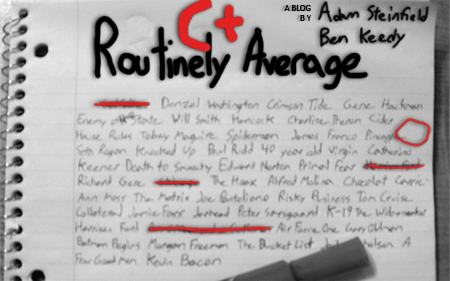 |
| Audrey Hepburn and Gregory Peck in Roman Holiday |
A while ago I had a long debate with a friend of mine on the importance of old movies. My friend, a terrific movie watcher and all-around good guy, was under the impression that old movies were virtually irrelevant at this point. Obviously special effects and graphics of today blow away the most advanced movies of 20 years ago, let alone the 1940s. My friend, lets call him Joe, went farther than that however, claiming all aspects of movie making were more sophisticated now. Screenwriting, acting, cinematography. Modern directors have learned from their predecessors and are now building on top of if. That is not to say that Joe thinks all new movies are great and all old movies are crap. He just feels that a good new movie tops a good old movie any day, and doesn't understand the fuss about all the classics. I have several other friends, movie lovers even, whose film watching repertoire is nearly complete among the new releases section, but develops giant gaps the farther back in time we go.
I hold a different view point. I love old films. Sometimes, I'll admit the label of classic can be misleading. If Roman Holiday were released today, it would star Julia Roberts or Rachel McAdams instead of Audrey Hepburn, and be rightly lambasted as pure escapism. Many Marilyn Monroe movies are downright sexist, and I even find (gasp) Casablanca to be a bit tedious. Just because they were great at the time does not mean they remain great now. I still enjoy watching these, mainly because I have some historian in me. Even though the original telephone cannot compare to an iphone in terms of utility and elegance, it would still be cool to use one. But I understand that argument does not apply to everyone. I love watching the truly great old movies for a very simple reason. They stood the test of time.
Christopher Nolan's Inception is a terrific movie. It is exciting, subversive, thoughtful, complex, event and character driven, philosophical while still being escapism. Yet as of right now, Inception has appealed to exactly one audience in time. The 2010 movie going audience. In 2040 will people still be wowed by the craftsmanship that went into Inception? I think so, but I also think Avatar, despite being a best picture nominee an the highest grossing film of all-time, will fade into history as at best, nothing more than a landmark for special effects.
 |
| Joseph Gordon-Levitt in Inception |
Then you have movies like The African Queen, Adam's Rib, or Citizen Kane. The Orson Welles' masterpiece was created in 1941. It continues to capture the hearts of cinephiles now almost 70 years after it was released. If I had to bet, I would guess that movie watchers will still be wowed by Citizen Kane in 2040 and long after that. For me at least, that is the definition of a classic.


